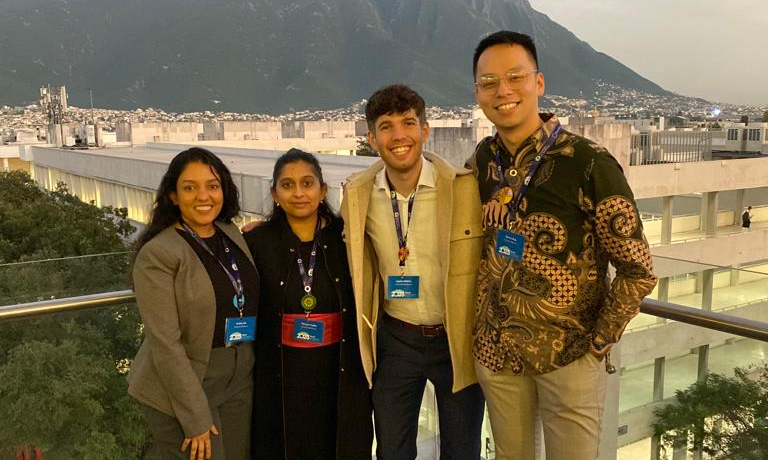A week in Mexico: How to make the most of Melbourne’s global learning opportunities
By Jayden Battey, Arshia Jain, Darren Ong and Devyani Vadke.

Pictured (L-R): Arshia Jain, Devyani Vadke, Jayden Battey and Darren Ong.
From enjoying the heat of an Indian summer, to being surrounded by volcanoes in Guatemala and experiencing the flavours of Mexico, we’ve spent 2023 as student researchers with the Reach Alliance.
Reach is a network of eight top global universities collaborating to support the world’s most marginalised. These are people who, due to one or many socioeconomic, political, or cultural factors, like conflict, poverty, remoteness, or colonisation, consistently miss out on the life-changing resources, such as healthcare and education, that lift people out of poverty and address inequality. Supported by professional coaching and expert mentors, Reach student researchers investigate how existing sustainable development programs are engaging such communities, and distill key learnings to inform global good practice.
In 2023, the University of Melbourne co-funded two inaugural research teams, together with the Reach Alliance and Mastercard’s Center for Inclusive Growth. Team India investigated how a local non-profit can scale its work addressing depressive and anxiety disorders without compromising service quality. Team Guatemala researched how empowering local education leaders can increase the relevance and quality of education outcomes in rural and Indigenous communities.
We’ve recently returned from the 2023 Reach Alliance Conference in Monterrey, Mexico, where we shared our research insights and learnings alongside colleagues from Ghana, South Africa, Singapore, Canada, the United Kingdom, and Mexico. We also had the opportunity to network with leading academics and subject experts from various organisations, including the World Bank.
Arshia, Master of Public Policy and Management student: Through participating in the Reach Alliance as a researcher and conference attendee, I have gained a greater appreciation for the importance of robust data collection in instigating change and influencing decision makers. As one of the conference speakers, Claudia Maldonado from the National Council for the Evaluation of Social Development Policy (CONEVAL) highlighted, "If we measure something, it can be improved." It wasn’t just about data and studies; we were weaving together stories and strategies that mapped out a better future. The conference showcased an array of impressive presentations, which illustrated the breadth and depth of research undertaken by emerging scholars. I feel inspired by the transformative power of engaging a diverse range of stakeholders in conversations and building collective momentum towards the United Nations’ Sustainable Development Goals (SDGs).
Darren, Master of Science (Epidemiology) student: Unlike traditional conferences, this conference put student researchers front and centre. The University of Toronto’s Vice President Professor Joe Wong noted that the tables have now turned, where the professors are instead learning from students (and that they took a lot of notes!). We were given the opportunity to share our individual research findings and discussed other important topics that we learnt throughout the research process. In my case, I was invited to be part of a fireside conversation on fostering community partnerships in research, where we discussed the importance of investing in respectful and genuine partnerships with local partners and communities. All the student researchers I met were very passionate individuals who I’m sure will be budding leaders in their respective fields. I made many friends and look forward to continuing working with them to advance the SDGs.
Devyani, Master of Education student: In education, we often hear the term ‘powerful knowledge,’ which goes beyond everyday facts as it allows us to think critically, develop insights beyond our immediate contexts, and can afford us social mobility. Information has never been more readily available to us now than at any other time in history, yet powerful knowledge is still only accessible to the privileged few who can receive a high-quality education. Participating in the conference reminded me that we, as student researchers, are a part of this privileged group. We therefore have a responsibility to disseminate our findings so that we not only spotlight the inherent strengths of the communities we visited and further support their endeavours, but also to ensure that their successful strategies can be scaled up to reach those facing similar developmental challenges.
Jayden, Master of Public Policy and Management student: No country has a monopoly on good ideas. Across the globe, every community is trying to understand how to structure life together in such a way that we all experience wellbeing. The benefit of coming together as a global community of researchers is that we turn the tables on traditional development practice. With Reach, listening is as important as contributing, and researchers are encouraged to reflect on good practice in development around the world and reflect on how our own communities can be informed by what we learn. If we are to address the major problems arising in the world around us, we need to take this approach: valuing humility, listening well, and building bonds of friendship between decision-makers at all levels of policy. Beyond the research, that’s what our time in Mexico truly facilitated: a practical guide on finding common ground, and forging ahead in continuing to build a better, more united world.
As the world endures an endless stream of disaster and global conflict, the Reach Alliance provides a meaningful platform for students to contribute to the global conversation. Find out more about Reach at the University of Melbourne.